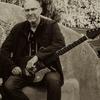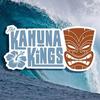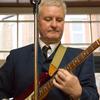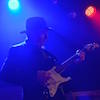Frelonvert

Joined: Sep 21, 2009
Posts: 275
Toulouse


|

Posted on Apr 10 2016 08:39 AM
I happily play rythm guitar in my surf/garage band since 5/6 years.
We went to studio to reccord our first LP lately and it was very fun and very hard also^^
I am seeking for advices because I am a little frustrated about my sound now.
I play with a yamaha sg2 or a jag with SDhot and I love both.
I use a reverb/delay pedal, a tubescreamer, a fuzz and a fender reverb tank.
My amp is an ampeg j-20 (something close to a brownface deluxe on the paper) but It is on repear for several months.
So I have played since on my bandmate princeton silverface... I am not really enjoing it. On studio I was connected with the princetone + tank reverb and a silverface Twin reverb... it was better inded.
I like to play rough and I have the feeling that the tank reverb is too much for me. It is great for playing single notes, or playing long chords.
But it get very messy with everything else...
so turn the tank down, switch the pedals etc... finding the right fuzz sound or crancked tube sound etc... I don't know.
I am struggling... struggling with ideas but not finding anything efficient.
I have concider changing my amp: a Quilter 101, a marshall for more dark overdrive? But I feel that I should try douzen of amps in rehearsal mode to be sure on what is the best for me and the band.
I believe that my role in the band is to stay behind the lead and make the people enjoy the tune and dance and sometimes jump on front with a big fuzzy riff or dark and strange solos ^^
So, any advice from the great rythm players here?
— http://noskons.bandcamp.com/
|
JakeDobner

Joined: Feb 26, 2006
Posts: 12159
Seattle



|

Posted on Apr 10 2016 01:00 PM
Lots of reverb and overdrive/fuzz don't mix particularly well. How low have you turned the reverb? Try having the mix and dwell on like 2-3 and the tone on 4-5.
What about the Princeton don't you like? Personally, I'd love a Princeton and would find it very useful for rhythm guitar, especially in a studio setting(not powerful enough for me live).
Listening to your tunes on bandcamp, you have A LOT of reverb on your rhythm guitar. Our first album I had reverb like that but I've consistently dialed the dwell back. I still have a wet drip but I don't have that long dwell that sits over everything and makes everything kind of muddy. It sounds good with the tons of reverb but if your goal is to make people dance then the tons of reverb distracts from linking up with the drums.
You have a reverb/delay pedal. You aren't using the reverb portion are you? And you aren't using the onboard reverb on the Princeton? If you are, definitely don't.
Keep using the Reverb Tank, it will sound the least cavernous out of an onboard/pedal. Just know that the knobs can dial it in from way too much reverb to barely any reverb. Mix and dwell! Dwell determins how long it is and mix determines how much clean signal gets affected by the reverb.
|
Frelonvert

Joined: Sep 21, 2009
Posts: 275
Toulouse


|

Posted on Apr 10 2016 02:55 PM
Thanks a lot Jake for your advices!
No, I don't use the reverb on the pedal, just a short delay. I used to when I didn't have the reverb tank (the bandcamp tunes are from this period).
The Ampeg j-20 and the princeton amps I have are without reverb and I almost never use the tremolo.
Mostly I turn down the reverb when I am using the fuzz with a footswitch.
I think that you are right, I put too much dwell and mix. Sometimes when I play single notes or long chords it sound great but it gets very muddy when I am playing faster riffs.
I think that I don't like the princetone because I barely can't hear myself without the overdrive on. I am always trying to put more volume from the amp or less from the overdrive pedal and I can't find a good balance.
I also tried a compression/sustainer pedal but this thing is doing only horrible feedbacks or string noises in my inexperience hands. I wanted to try this because I have red that Link Wray only used a compression/sustainer pedal thru a jcm800 or twin reverb.
I was looking for his kind of punchy sound.
All in all, I know that the sound quest is a long journey. But it is complicated when you don't know how to start it or when there is too much switches involve.
— http://noskons.bandcamp.com/
Last edited: Apr 10, 2016 14:58:07
|
JakeDobner

Joined: Feb 26, 2006
Posts: 12159
Seattle



|

Posted on Apr 10 2016 03:57 PM
Also, try turning the treble up on the amp and if it is too bright adjust via the tone knob on the guitar.
And you might also want to try setting the Princeton to 10 and then using your guitar to dial off the excess volume.
Sitting right in the band is hard! I've both succeeded and failed at this and it takes practice even when you think you are dialed in right.
|
tahitijack

Joined: Nov 03, 2006
Posts: 693
San Clemente, CA

|

Posted on Apr 10 2016 05:15 PM
Jake would good advice include starting clean then adding each effect one point at a time until a satisfactory tone appears. Just a thought....
— Happy Sunsets!
|
JakeDobner

Joined: Feb 26, 2006
Posts: 12159
Seattle



|

Posted on Apr 10 2016 06:04 PM
I'd recommend to anybody using a tank to become intimate with what the knobs did before adding any effects. And even then, your on amp/guitar tone knobs are your best friend.
|
JObeast

Joined: Jul 24, 2012
Posts: 2762
Finknabad, Squinkistan




|

Posted on Apr 10 2016 07:39 PM
I might suggest using an amp that has a modicum of headroom and pushes enough air to keep up with other instruments. A Twin Reverb ought to do that very well in most situations and any needed compression could be added with an OD or Rangemaster. Or a smaller amp, but with enough speaker cone surface to propagate a fulsome sound.
The simpler the better is a good dictum to follow.
Maybe also experiment with different guitars to find one with a voice that contrasts and compliments the lead. Might be a hollow body with humbuckers, you never know!
— Squink Out!
|
DannySnyder

Joined: Mar 02, 2006
Posts: 11075
Berkeley, CA











|

Posted on Apr 10 2016 10:39 PM
I know your question was mainly about choice of amplification and use of reverb, but I'd like to touch on surf rhythm guitar in a more general way. BTW I play rhythm guitar in Meshugga Beach Party and in the past for Frankie and the Poolboys, and do full arrangements for my own band The TomorrowMen. As a guy who plays both rhythm and lead, I genuinely enjoy playing rhythm as much as lead.
In a typical 4 piece instro band, the rhythm guitar is akin to the orchestra backing a vocalist. You have a lot of options that impact much of the overall shape of the song. The challenge for you is to listen to the song and figure out how best to serve it. Balancing the two duties of supporting the rhythm section and supporting,countering or harmonizing the lead melody.
If you listen close to many acclaimed (modern) surf arrangements, I'm sure you'll find that the rhgtr is rarely playing full chords. One of the best strategies for rhgtr is to stay away from the same note register as the lead. So if the lead is playing on the lower three strings, then you play triads higher up the neck. This not only leaves air for the melody, but it allows you to stand out as well, without having to turn up the volume.
A tactic I like is to change things up in a song. On the verse you can double with the snare drum, and on the chorus switch to a strum. The impact of that change can really add to the dynamics of the song. Or listen to the rhythmic pattern of the bass guitar and try to reinforce that, either with chords or a note pattern. The key is to not step on anyone else's toes rhythmically. That creates muddiness, you'll sound weaker and the song will suffer.
It's paramount to listen to the rhythmic pattern and interplay of the drums and bass. If they're really busy, maybe all you need to do are chord washes, or double the bass or snare, or harmonize to the lead part with doublestops. Conversely, if the bass and drums are keeping it simple, you can step up and start to play a gallop or some 1/8th note down stroke chords, or write a simple counterpoint to the main melody.
One final note, you have a lot of control over your volume just using your hands. Your right palm (if you're right handed) can be used very subtly, and your right hand attack has a lot of range as well. I know Jake (for instance) likes to use his guitar's knobs, I personally never do that. Just moving to different registers or dropping from a big chord to a double stop can get the same results, and sound more interesting to boot.
I think the easiest way for all musicians to improve is to develop their ears,and learn to listen critically to the music they like and want to emulate. Listen to the choices other guitarists make and then imagine substituting some of those techniques in your own songs.
Best of luck!!!
— Danny Snyder
"With great reverb comes great responsibility" - Uncle Leo
I am now playing trumpet with Prince Buster tribute band 'Balzac'
Playing keys and guitar with Combo Tezeta
Formerly a guitarist in The TomorrowMen and Meshugga Beach Party
Latest surf project - Now That's What I Call SURF
|
JakeDobner

Joined: Feb 26, 2006
Posts: 12159
Seattle



|

Posted on Apr 10 2016 10:45 PM
DannySnyder wrote:
One final note, you have a lot of control over your volume just using your hands. Your right palm (if you're right handed) can be used very subtly, and your right hand attack has a lot of range as well. I know Jake (for instance) likes to use his guitar's knobs, I personally never do that.
I should clarify. I set and leave the tone to where it needs to be for my setup/the room. And my volume only has two settings that I use, lead and rhythm. Most of my volume is in my right hand.
|
stratdancer

Joined: Dec 11, 2013
Posts: 2537
Akron, Ohio



|

Posted on Apr 11 2016 04:59 AM
Surf rhgtr is quite a unique style of musicianship as compared to other styles of music. It takes discriminating ears as Danny mentioned and has to fit properly. In doing all the rhgtr along with leads in recordings I found surf rhgtr challenging at first especially doing Astronauts style drip ticks with muting techniques. It is more percussive and your timing has to be perfect. Amp settings, attack and muting are very critical elements. I have the utmost respect for fulltime, dedicated rhgtr surf guitarists. Their precision is above and beyond that of a rock guitarist playing a les paul through a marshall.
— The Kahuna Kings
https://www.facebook.com/pages/The-Kahuna-Kings/459752090818447
https://thekahunakings.bandcamp.com/releases
|
Clarry

Joined: Oct 01, 2014
Posts: 519
Streatham, London



|

Posted on Apr 11 2016 05:45 AM
This is very interesting and timely for me. I had a gig on Saturday night and a sound engineer friend came along and gave us loads of tips and constructive criticisms. We’re not an instrumental band, we do mid-60s British Beat and rock and roll. For me, the rhythm guitarist, his main criticism was “great sound for the period, but too similar to the lead when he’s playing chords”. The lead tends to play a lot of open ringing chords between fills etc., and I’ve often noticed while rehearsing that it doesn’t sit well with me…it’s too similar to what I’m doing and can get muddy. So it’s probably easier for me listen for this and adapt my own playing as he has enough to do with singing too. First step will be; if lead has reverb/echo, I go cleaner and vice versa. I play mostly barre chords up the neck, so a bit more muting the “chord hand” will also help on some songs.
These threads are a fantastic source of advice. Thanks
|
Badger

Joined: Nov 16, 2013
Posts: 4537
Wisconsin







|

Posted on Apr 11 2016 06:37 AM
Clarry wrote:
These threads are a fantastic source of advice. Thanks
 Tagged; thanks for the honest topic. Much interest; the better of my efforts at home recording recently have come from both dialing back the outboard reverb tank (the gear side) and listening to where the rhythm needs to sit so as to compliment/support the melody rather than compound it & muddy it up. Still training my ear so advice in threads like this is valuable. Tagged; thanks for the honest topic. Much interest; the better of my efforts at home recording recently have come from both dialing back the outboard reverb tank (the gear side) and listening to where the rhythm needs to sit so as to compliment/support the melody rather than compound it & muddy it up. Still training my ear so advice in threads like this is valuable.
— Wes
SoCal ex-pat with a snow shovel
DISCLAIMER: The above is opinion/suggestion only & should not be used for mission planning/navigation, tweaking of instruments, beverage selection, or wardrobe choices.
|
ArtS

Joined: May 09, 2008
Posts: 1398
Isle of Kent, MD







|

Posted on Apr 11 2016 07:52 AM
Lot of great advice here; I especially like Danny's take. I would add, listen to the lead and their setup/sound. Two super reverb guitars, or guitars with same tone don't mix well. Also, don't be afraid to change your setting (slightly) throughout the mix. The Rhythm can really influence the flavor of a song. I worked with Joe Atkins and he was great out playing one sound one moment and then adding a bit of flavor for about 4 measures and then dialing it back down. Also, I'm sure it's been said, but studio is very different from live and you can add a lot of stuff in that help make the song what it was meant to be not what you can do live. Anyway, I think it's great that you are willing to ask advice to improve. Good luck!
— Surf.The most dangerous of genres...
Surfcat
MARCH OF THE DEAD SURFERS! (2024) - Agent Octopus
THE JOURNEY HOME - Free download (2025) - Agent Octopus (Single)
BANDCAMP - Agent Octopus
YOUTUBE - Agent Octopus Surf
BANDCAMP - Reverb Galaxy
|
josheboy

Joined: Mar 13, 2009
Posts: 2367
Twin Cities, MN




|

Posted on Apr 11 2016 10:48 AM
I'm currently working on rhythm for an upcoming 50 minute set with The Counselors. I haven't played with them for nearly 2 years, so I'm having to learn a couple new songs and relearn some some old songs.
When I first learned their set a few years ago, I was learning like 30+ songs in a matter of weeks, so most of my focus was just on chord and change memorization. But now I remember a few of the songs already, so I was noticing that I really hadn't been paying attention to some of the dynamics Danny mentioned. I'm definitely guilty of playing full chords a lot. Some of the covers we play demand it, and you can clearly hear them in the songs. But some of the songs can be more subtle or need different chord fingerings or neck placement or octave. I'm going to try to re-work how I play some of these songs. The above advice will really help! Thanks!
|
Frelonvert

Joined: Sep 21, 2009
Posts: 275
Toulouse


|

Posted on Apr 12 2016 02:10 PM
Thanks a lot, buddies, for sharing your experience!
It means a lot to me.
Yes, it can be hard to find the right place between the lead guitar and the bass. Most of times, when we are doing a new composition, I let them play and when they are ok... I test different rythms, sounds. He takes me 5/6 rehearsals to begin to feel and know what I should do and begin to enjoy it.
To continu this discution, it would be great to share audio/video samples of what you guys consider un great/cleaver/ingenius/efficient rythm guitar part on a surf song (classic or new).
Any examples?
— http://noskons.bandcamp.com/
|
slopoke

Joined: Dec 24, 2013
Posts: 145
Maribor



|

Posted on Apr 13 2016 06:23 AM
I like the rhythm guitar in The Supertones. It always fits perfectly in the song:
— https://striciizozadja.bandcamp.com/
|







































